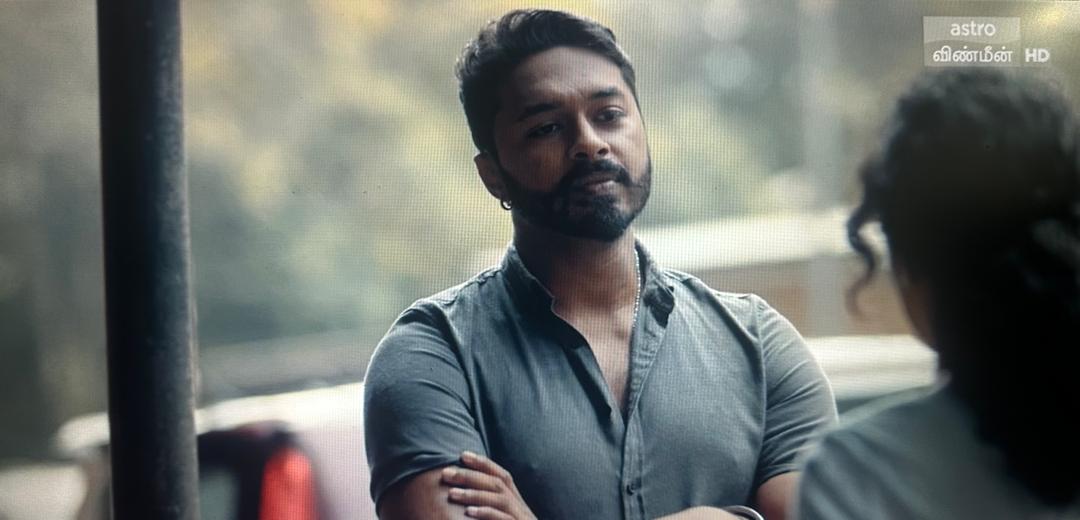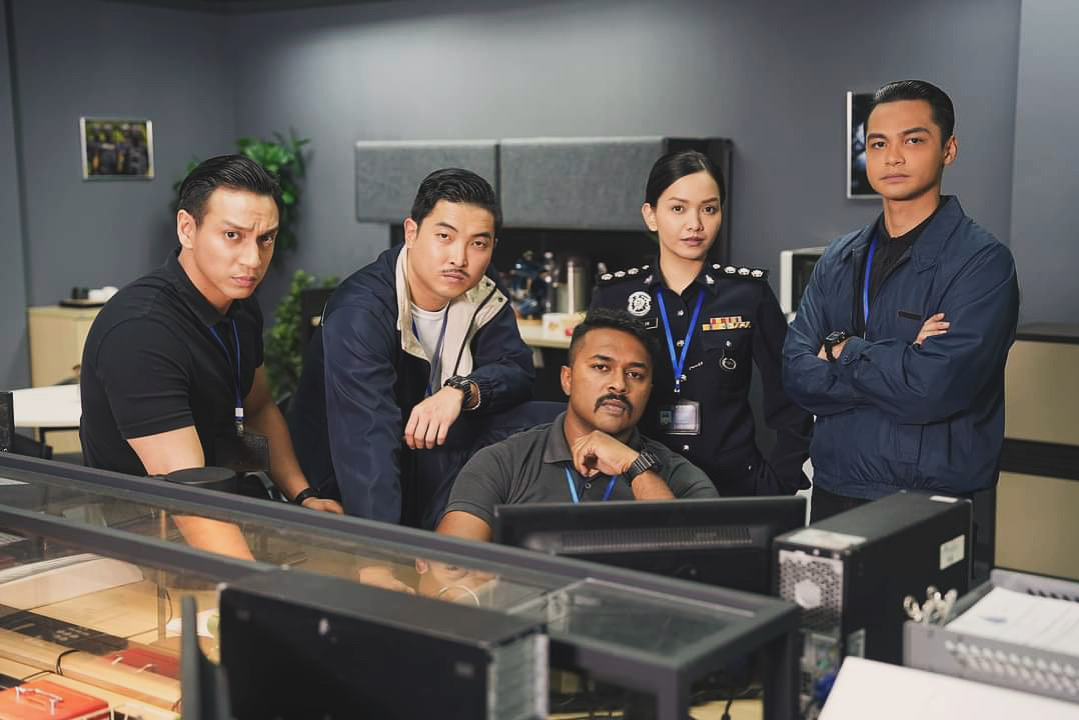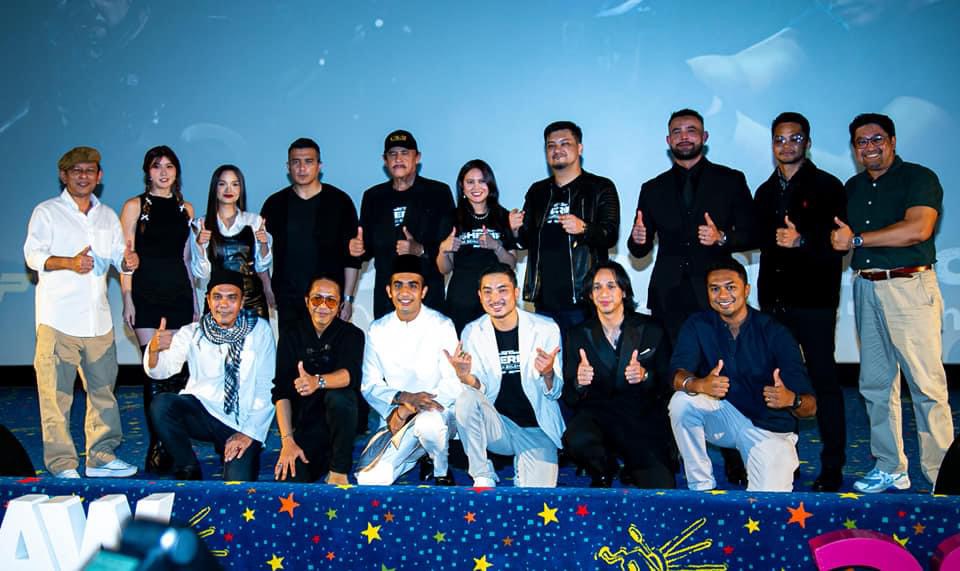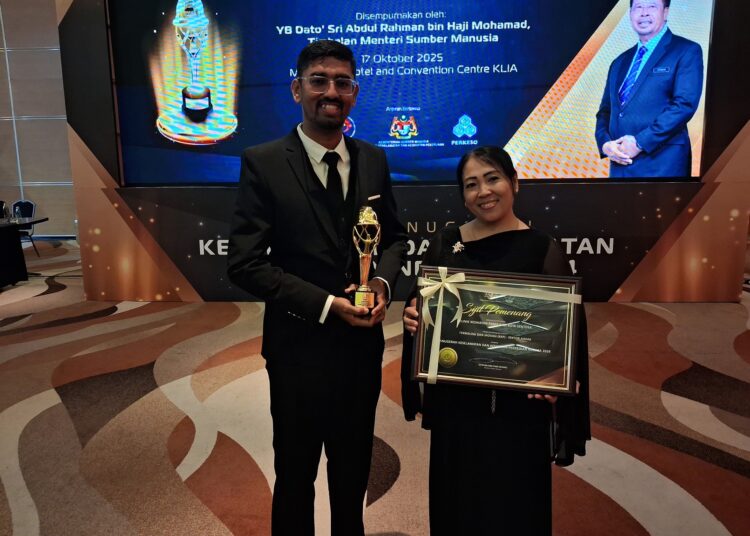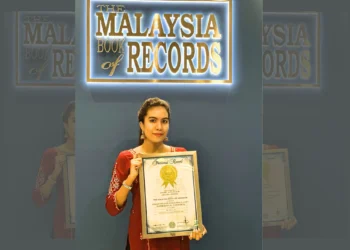Up-and-coming actor Meynillen Thamil Selvan has just gotten his first big break with his role as Detective Nagarajah in director Syafiq Yusof’s successfully running Malay film titled Sheriff, explores the theme of corruption within the police department. In this in depth interview, Meynillen shares his experience of the film, his aspirations for working in more diverse roles, and his hope for the establishment of a Malaysian cinema that would encompass the true diversity and depth of Malaysian society.
About Meynillen Thamil Selvan
32-year-old KL-born Meynillen had spent most of his life growing up in Selayang. The second son among four brothers, the young boy grew up being captivated by Tamil cinema. Meynillen says that his greatest ambition as a child was to be an actor. He was most drawn to the way actors could embody and express varied emotions and thoughts, and he too wanted to experience those multitudes of personas in the visual media. But because of the discouragement of his parents, who were worried about the survival of their son in the competitive and uncertain industry of Malaysian Tamil cinema, Meynillen had grown up to pursue a standard education in engineering, started working in customer service, and progressed to working in marketing.
However, even while working in marketing, he pursued acting part-time, performing as an extra on numerous shows across languages, such as Kavi Nanthan Kathirvelo’s Venpa and Syafiq Yusof’s Special Force: Anarchy, among many others. Then, during the COVID-19 pandemic, Meynillen, with the support of his wife, who had stood by him as an anchor, made the life-altering decision that he would pursue acting full-time. He expressed that he had realised that he didn’t want to wake up one day in his future and regretted that he hadn’t pursued his dreams. So after the pandemic, he began devoting himself entirely to acting, working on many supporting roles for films like Kaval 3, Manmadhan Bullets, and Manmadhan Bullets 2, Kalluri Naatkal, and Nadunisi KL.
Meynillen expresses that if you can lose yourself completely to your passion willingly, despite the difficulty, despite the struggle, and despite the exhaustion, that is your true calling in this life. Acting is the spirit that keeps Meynillen alive, conscious, and breathing. He shares how he felt this purpose on the set of his first ever short film, Uruvam Ondre, directed by Ashwin. All through the shooting of the short film, which was in the span of 8 days, he was the first to be awake and be on set, exhausted but exhilarated with the world of cinema.
Small Beginnings in the Big Industry
When Meynillen first began acting, he would attend every casting call and do every job that was handed to him just to gain exposure. On a small role he had done with a TV2 Tamil drama, the director told him that although he had a lot of passion, there was still a lot he needed to learn about the craft. As a way to sharpen his skills, Meynillen took an acting course with director Kesavan Sugumaran for nearly 4 months, learning more about the depth and discipline that came with acting. He had also expressed how working on Manmadhan Bullets season 1–2 had gained him good recognition and visibility. Meynillen does note that while he has gotten the chance to work on many diverse projects, most of his roles are police characters. He expresses that he wants to break away from this typecast and gain the opportunity to portray more distinct and divergent characters that would challenge him as an actor.
Meynillen sees Kollywood actor Suriya as an artist he looks up to because he too had been criticised for being too stiff and stagnant in his performance, and through unrelenting perseverance, Suriya had moulded himself to be a more fluid and malleable actor. Meynillen also sees that, apart from Kollywood actors like Kamal Hassan and Vijay Sethupathi, He also greatly admires the work of Dato Yusoff, Haridass, and Karthik Shamalaan for how they laboured so devotedly towards their craft that directors such as Kathick Shamalaan have created their own trademark in the industry. Along with them, he also expressed his adoration for Karnan, who had progressed from the music industry to being a renowned actor who not only excels in commercially hit films like Geethaiyin Raathai, which is one of the Top 10 grossing Malaysian Tamil films, but also expresses himself brilliantly in alternative Tamil films like Sun-J Perumal’s upcoming Neer Mel Neruppu. Meynillen also has a small role in Sun-J’s other upcoming film, Machai. He notes that art films like Neer Mel Neruppu and directors such as Sun-J Perumal are important in building a Tamil art film culture, which is vital for the growth of the film ecosystem in Malaysia.
On Working in Sheriff
Meynillen had expressed his utter disbelief and shock over getting the part of a significant supporting character in Sheriff. The budding actor had actually maintained connections with Skop Productions, one of the production companies for the film, who had contacted Meynillen one night, asking him to send a video of himself reading some lines in Malay. After sending the video, Meynillen didn’t think much of it, presuming that it would only be another miniscule role as an extra, but it was only after getting on the set that he realised that he had a prominent supporting role in the film, appearing in many scenes that required him to block 30 days of his date.
On working with renowned filmmaker Syafiq Yusoff, Meynillen articulated how the director had a very demanding, precise, and unrelenting vision for his films. The director had a meticulous method of translating scenes from his mind to the set, devoted to perfecting his visions into the visual medium of film. Meynillen articulated that Syafiq would be diplomatic in his demanding of perfection, be it from supporting actors or lead actors; at the same time, the director would also be encouraging to Meynillen, helping him grow and nurturing his talent. As for the cast, which consists of many prominent actors such as Zul Ariffin, Shafiq Kyle, and Aaron Aziz, Meynillen expressed that he felt completely welcomed and respected without any egos or disparities between established actors and up-and-coming actors. He stated that he had spoken a lot to Zul Ariffin, who had shared with Meynillen valuable advice and insight into the film industry and acting. Even during scenes, many of the established actors would allow up and coming actors to express their thoughts and ideas of how the lines should be read, allowing for there to be a nurturing space for actors to exchange their ideas and develop their skill.
Difference between Tamil and Malay Productions
 Meynillen, who has nearly nine years of experience in the Malaysian film industry, has worked in both Malay and Tamil productions, which vary not only in language but also in how their production operates. The young actor details that Malay productions have the capacity to execute a scene exactly to their vision; they are uncompromising in their pursuit of getting the shot that they want, not worrying about the constraints of a budget. Whereas for Tamil productions, there are many compromises made, leaving scenes to be finalised half-heartedly because of the many constraints and limitations when it comes to Tamil productions. Meynillen notes that there are restrictions that force Tamil productions to compromise on the quality of filmmaking for many reasons, like restraints in budget, schedule, and lack of space allocation. Another stark difference between the two productions is that Malay productions do have some form of pre-production planning with a level of effort contributed towards storyboarding, which Tamil productions severely lack.
Meynillen, who has nearly nine years of experience in the Malaysian film industry, has worked in both Malay and Tamil productions, which vary not only in language but also in how their production operates. The young actor details that Malay productions have the capacity to execute a scene exactly to their vision; they are uncompromising in their pursuit of getting the shot that they want, not worrying about the constraints of a budget. Whereas for Tamil productions, there are many compromises made, leaving scenes to be finalised half-heartedly because of the many constraints and limitations when it comes to Tamil productions. Meynillen notes that there are restrictions that force Tamil productions to compromise on the quality of filmmaking for many reasons, like restraints in budget, schedule, and lack of space allocation. Another stark difference between the two productions is that Malay productions do have some form of pre-production planning with a level of effort contributed towards storyboarding, which Tamil productions severely lack.
Meynillen also expressed that contemporary Malay productions are working towards molding themselves in contrast to the older generation of Malay films, breaking formerly held stereotypes and forming new narratives. He articulated that this can be seen in Sheriff itself with director Syafiq Yusof, who broke the film taboo of painting the Malaysian police in a negative light with his film Sheriff, which shows the Malaysian police having both policemen who abide by the law and those who disobey the law. Meynillen wanted this shattering of rules and constraints to be emulated by the Tamil industry as well.
Constructing a Malaysian Film Identity
The optimistic and spirited Meynillen hopes that his career will progress to one that will allow him to become an accomplished character artist who will get to instrumentalize his body to express the multitudes of consciousnesses that society bears. Meynillen especially noted that he really wanted to act in a villain role to expand his artistry. He had also expressed that to train his body, mind, and spirit to further his acting ambition is was not enough to only nurture a strong sense of passion for it, but to actualise his being into a disciplined and dedicated artistic medium. Meynillen also wants to branch out into the field of cinema by learning how to become a director. Although the actor has directed some advertisements and music videos, he states that he still has a long way to go but would love to push himself towards understanding the craft of direction better. He also expressed that aspiring filmmakers should not lose hope too quickly, citing that although it can be disheartening when projects are postponed or cancelled and there is much competition in the industry, young actors should not lose hope and must overcome these struggles by continuing their perseverance.
As for the future of the Malaysian film industry, Meynillen hopes that the divisions between the Malay, Tamil, Chinese, and Bornean industries will dissolve to form a cohesive, singular, and diverse Malaysian industry. He notes that when films like Sheriff, which consist of a multi-ethnic cast, can become successful, this method of inclusive filmmaking should be further emulated until a definitive Malaysian film identity is established. Meynillen articulates that just as there exists a Malaysian tourism brand that advertises the diversity and unity of Malaysian society and culture, so too should the Malaysian film industry express the distinct cultural and aesthetic nature of Malaysian cinema to the world. Meynillen noted that although he was happy about Sun-J Perumal’s Neer Mel Neruppu being showcased in Vietnam, it was slightly disheartening to watch a Malaysian Tamil film have its Southeast Asian premier at Vietnam’s Ho Chi Minh International Film Festival and not in its home country. Meynillen states that for Malaysian films to prosper, people have to work towards constructing this united film identity and that artists and film practitioners should not give up on creating cinema. From Venba to Naam Katra Isai, Malaysian Tamil cinema has gone through many triumphs and failures, yet Meynillen definitively states that through this dialectical motion, we should not deter our struggle but labour towards understanding the reasons for shortcomings and work together as an artistic force to keep Malaysian Tamil cinema alive and nurture it towards new evocative heights.
Follow us on Instagram, Facebook or Telegram for more updates and breaking news.



